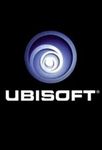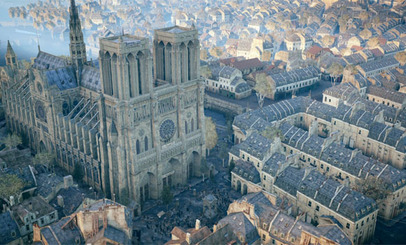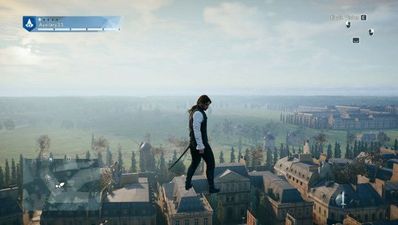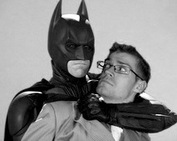
Even before its release Assassin's Creed: Unity faced controversy. The developers found themselves in hot water when they revealed that they had refused to invest in the resources required to make playable female protagonists in the game's online co-op mode. This caused a backlash from fans and even caused some to boycott the game's release in November, but also made a mockery of Ubisoft as one of gaming's leading designers in the industry today.
 Paris in Assassin's Creed: Unity.
Paris in Assassin's Creed: Unity. It was designed to be the first Assassin's Creed exclusive to the newest generation of systems and serve as both a continuation and a reboot (or sorts) in order to reel in new players. The game's setting was chosen as Paris during the middling years of the French Revolution (which had been a request from the fans for some time), which was a step away from the multiple location settings of its most recent - and most highly regarded - predecessors. There was no denying that it would take everything for Unity to surpass the might of Assassin's Creed IV: Black Flag, which scored the highest review scores from both critics and gamers alike right across the board. When Unity was first released, the developers came immediately under fire as all versions of the game appeared to be riddled with game-breaking glitches. The console versions featured virtually unplayable in-world instability, meaning that the player character would fall through the floor or latch onto invisible surfaces, and the PC version featured comical visual errors - such as the facial animations and skins blinking in and out of existence (which have become of the focus of recent internet memes). The game also had a range of frame-rate issues, as had become a custom of the series thus far. All Assassin's Creed titles has frame-rate problems because Ubisoft insist on releasing at least one new Assassin's Creed title every single November and have done since 2010's Brotherhood. Glitches were - of course - always to be expected in Unity and perhaps more so than usual. The sheer size and scope of building revolutionary Paris alone, which had been built fresh from the ground up and constructed to near historical accuracy, was never going to give to open world perfection because it was simply too ambitious a project in too little a development period (despite what Ubisoft might claim), but there was only so much that players could excuse. Los Santos from Grand Theft Auto V, for instance, took five years development time to reach the level of scale and stability it had upon release. Paris of Unity had a comparably sizeable scope but was put together in far less time, and so the development team had no chance to riddle out all of these stability issues. As a result, and for most gamers, the experience was ruined on release day.
On top of that, players who could actually navigate the gameplay normally complained that the storyline itseklf was a little routine and boring compared to that of the previous year, and the unwelcome return to the one-city setup felt like such a backstep considering that all of the games since Assassin's Creed: Revelations had featured a varied multitude of different locations. Unity was the first Assassin's Creed since 2010's Brotherhood to shift focus back to a singular primary location which - I feel - was Unity's biggest letdown.
 Arno walks above the city in one of the game's many glitches.
Arno walks above the city in one of the game's many glitches. But it may have already been too late. Watch_Dogs and Assassin's Creed: Unity were Ubisoft's most financed and well-marketed games of 2014, and they had both fallen flat in the eyes of the consumers. I personally traded in Unity for a next-gen version of a game I already owned for last-gen (Saints Row IV: Re-Elected) because I'd rather go back and play that than force myself to lug through the boring, retro world presented in Unity. The game does introduce a really interesting level of customisation which I hope Ubisoft carry over into the sequels and, whilst the graphics are pretty, though tragically not as groundbreaking as they were presented at E3 (but thankfully not to the horrible extent of Watch_Dogs), and the orchestral soundtrack is truly engaging and beautiful - those are really Unity's only assets.
Pray for the future of Assassin's Creed


 RSS Feed
RSS Feed
